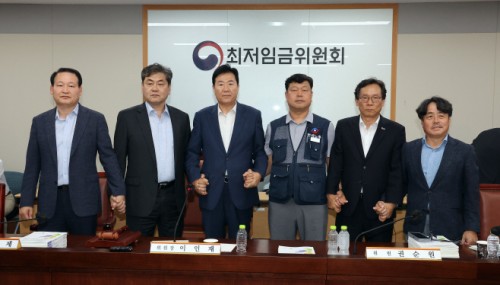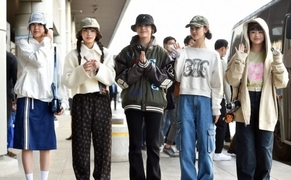 |
| Lee In-jae (second from left), chair of the Minimum Wage Commission, shakes hands with representatives of labor, management, and public interest groups after the commission agreed to set the 2026 minimum wage at 10,320 won per hour during the 12th plenary session at the Government Complex Sejong on July 10. / Source: Yonhap News |
South Korea’s minimum wage for 2026 has been set at 10,320 won ($7.45) per hour — a 2.9% increase from this year — marking the first time in 17 years that labor, management, and public interest members have reached an agreement without a vote.
The Minimum Wage Commission finalized the decision during its 12th plenary session at the Government Complex Sejong on July 10. The new wage is 290 won higher than this year’s 10,030 won. Based on a standard of 209 working hours per month, the monthly minimum wage will be 2,156,880 won.
After weeks of negotiations, labor and management narrowed their differences. Labor groups initially demanded 11,500 won per hour (a 14.7% increase), later lowering the request to 10,430 won (4.0%). Meanwhile, business representatives, who initially called for a freeze, ultimately offered 10,230 won (a 2.0% increase). The final compromise was reached at 10,320 won.
It was the eighth time since the system’s introduction in 1988 that labor, management, and public interest members reached a consensus on the minimum wage.
Lee In-jae, chair of the Minimum Wage Commission, said, “Today’s agreement demonstrates our society’s ability to resolve conflicts through dialogue,” adding that he hopes the commission will be recognized as a platform for social consensus beyond labor-management disputes.
However, four labor representatives affiliated with the Korean Confederation of Trade Unions (KCTU) walked out of the meeting, preventing a full consensus.
At the 11th session on July 8, KCTU criticized the proposed mediation range of 10,230–10,430 won as being favorable to management and demanded it be withdrawn. When their demand was rejected and the ninth amendment remained within that range, the KCTU declared a boycott and exited the meeting.
KCTU Vice Chair Lee Mi-seon said, “We had hoped for a consensus until the end, but the trust was broken when the mediation range tilted in favor of the employers was pushed through.” She added, “We asked public interest members to withdraw and reset the range, but after being refused, we concluded we could no longer participate in the discussion.”
While the agreement marks procedural progress, the 2.9% hike is the lowest first-year minimum wage increase for any administration — even lower than the Yoon Suk-yeol government’s 5.0%.
For comparison, first-year wage hikes under previous administrations were: Kim Young-sam (7.96%), Roh Moo-hyun (10.3%), Lee Myung-bak (6.1%), Park Geun-hye (7.2%), and Moon Jae-in (16.4%).
Ryu Ki-seop, Secretary General of the Federation of Korean Trade Unions (FKTU), said, “The government must provide additional support measures for low-wage workers covered by the minimum wage,” urging the state to play a fair and balanced role in future discussions.
The Minimum Wage Commission will now submit the finalized wage to the Minister of Employment and Labor, who must officially announce it by August 5. The new wage will take effect on January 1, 2026. Both labor and management can file objections before the announcement, but given the rare agreement, such objections are considered unlikely.
Most Read
-
1
-
2
-
3
-
4
-
5
-
6
-
7





















